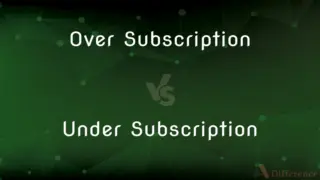Pressure Group vs. Political Party — What's the Difference?
By Tayyaba Rehman — Published on October 15, 2023
Pressure Groups advocate for specific issues or causes without contesting elections, while Political Parties aim to gain political power by winning elections.

Difference Between Pressure Group and Political Party
Table of Contents
ADVERTISEMENT
Key Differences
Pressure Group and Political Party are distinct entities within a political framework. Pressure Groups are usually non-partisan organizations that focus on promoting or opposing particular policies, ideas, or issues. Their primary goal is influencing decision-makers and public opinion on certain topics without the intention of directly entering the political arena.
Political Parties, in contrast, are organized groups that contest elections to gain power and influence in a government structure. Their goals encompass a broader spectrum, including implementing a variety of policies and agendas. Political Parties have a more comprehensive stance on issues and present a complete governance blueprint to the electorate.
While Pressure Groups may comprise individuals with varied political beliefs united by a common issue, Political Parties require adherence to a broader set of principles and ideologies. Parties often have structured hierarchies and a distinct leadership, whereas pressure groups might operate more informally.
Another distinguishing factor is their approach to change. Pressure Groups typically use lobbying, advocacy, or public campaigns to achieve their goals. On the other hand, Political Parties aim to enact change from within the governmental system by winning seats and influencing legislation.
In essence, while both Pressure Groups and Political Parties play pivotal roles in shaping political discourse, their methods, intentions, and operational structures vary significantly.
ADVERTISEMENT
Comparison Chart
Primary Goal
Influence specific policies or issues
Gain political power via elections
Participation
Non-partisan; no electoral participation
Contest and participate in elections
Scope
Narrow, issue-specific focus
Broad, encompassing varied issues
Method
Lobbying, advocacy, campaigns
Legislation, governance
Organizational Structure
Often informal or decentralized
Structured with clear hierarchies
Compare with Definitions
Pressure Group
A non-electoral entity pushing for changes in public policies or societal norms.
The pressure group for animal rights protested outside the city council.
Political Party
A body with a broad set of ideologies aiming for legislative and executive roles.
The new political party promised tax reforms and healthcare improvements.
Pressure Group
A group that operates outside formal political mechanisms to impact decisions.
The pressure group sent petitions to legislators on climate change.
Political Party
A collective that provides a platform for individuals to voice political opinions and contest elections.
The youth-centric political party aimed to bring fresh perspectives to the assembly.
Pressure Group
An organization that seeks to influence governmental decisions without aiming for political office.
The environmental pressure group lobbied against deforestation.
Political Party
An entity that represents specific social, economic, or political interests in a governance structure.
The political party focused on workers' rights gained significant support.
Pressure Group
A collective that promotes a specific cause or agenda without partisan affiliations.
The health pressure group advocated for better medical facilities.
Political Party
An organized group that seeks to gain power within a government through elections.
The political party launched its campaign for the upcoming elections.
Pressure Group
A body that employs advocacy, protests, or lobbying to achieve its aims.
A local pressure group organized a march for housing rights.
Political Party
A structured group with hierarchies, leadership, and a membership base.
She became a member of the political party at a young age.
Common Curiosities
What is a Pressure Group?
A Pressure Group is an organization that tries to influence governmental decisions on specific issues without seeking political office.
Can members of a Pressure Group be part of a Political Party?
Yes, individuals can support a Pressure Group's cause and still be affiliated with a Political Party.
What's the main aim of Political Parties?
Political Parties primarily aim to win elections and govern.
What methods do Pressure Groups use?
Pressure Groups use lobbying, advocacy, public campaigns, and sometimes protests.
How does a Political Party function?
A Political Party contests elections with the goal of gaining political power and implementing its policies.
Do Pressure Groups have a political alignment?
While some Pressure Groups may have biases, they are generally non-partisan and focus on specific issues.
How do Political Parties influence policy?
Political Parties influence policy by winning elections, legislating, and forming governments.
Can a Pressure Group transform into a Political Party?
While rare, some Pressure Groups, driven by broad support, can evolve into Political Parties.
Why are Political Parties important?
Political Parties offer choices to voters, provide governance frameworks, and hold governments accountable.
Do Pressure Groups represent the general public?
Some Pressure Groups claim to, but they primarily represent specific interests or causes.
What's the difference in membership?
While both can have members, Political Parties often have a more structured membership system.
Do Pressure Groups have international affiliations?
Some Pressure Groups are part of larger international networks advocating for similar issues.
Can Pressure Groups and Political Parties collaborate?
Yes, they can collaborate on issues of mutual interest or concern.
How are Political Parties funded?
Funding sources vary, including member contributions, public funding, and donations.
Can someone be expelled from a Political Party?
Yes, based on party rules, members can be expelled for various reasons.
Share Your Discovery

Previous Comparison
Over Subscription vs. Under Subscription
Next Comparison
Custard vs. Ice CreamAuthor Spotlight
Written by
Tayyaba RehmanTayyaba Rehman is a distinguished writer, currently serving as a primary contributor to askdifference.com. As a researcher in semantics and etymology, Tayyaba's passion for the complexity of languages and their distinctions has found a perfect home on the platform. Tayyaba delves into the intricacies of language, distinguishing between commonly confused words and phrases, thereby providing clarity for readers worldwide.














































